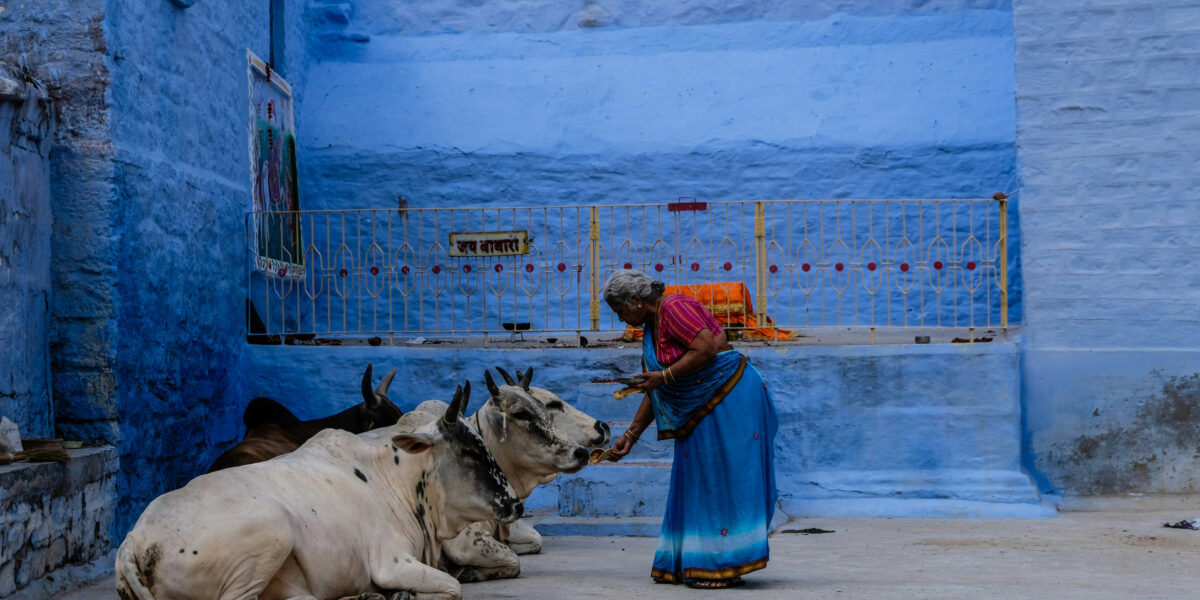Areeba Sherwani a Research Associate at the Ayaan Institute highlights the everyday lived reality for Muslims in India; where lynchings to death, cow vigilantism, and bulldozing of homes are the norm.
Fear and Faith: Cow Vigilantism and Muslim Lynchings in India
On the eve of Eid-ul-Adha, the people of Aligarh woke up to see a viral video of a man being ruthlessly beaten by a mob of 22 people with lathis, kicks, and punches even as he floundered on the roadside and begged for his life.[i] The man was identified as Mohammad Farid aka Aurangzeb, a 35-year-old man lynched by a Hindu mob on the ‘suspicion of theft’ in Uttar Pradesh’s Aligarh on Tuesday. Another video showed a policeman carrying an injured Farid into the hospital where doctors declared him dead on arrival. It marks the fourth case of mob lynching of a Muslim in 12 days.
The police stated the mob lynched Farid who was returning home from work on the night of 18th June, ‘broke into the house’ of textile trader Mukesh Mittal, and he was ‘confronted’ by the people. However, Farid’s brother said the group attacked him only after finding out he was a Muslim.
Hindutva group Bajrang Dal, meanwhile, alleged that Farid had entered Mittal’s house intending to steal and that the crowd’s response was ‘a normal reaction’.[ii]
“Though I do not justify mob lynching, those trying to protect a thief should remember clearly that Uttar Pradesh is still ruled by Yogi Adityanath, whose government has zero tolerance for crime,” Gaurav Sharma, a local Bajrang Dal convener, was quoted as saying by the newspaper. “Do not forget that bulldozers had razed properties of such elements and these [bulldozers] will roar again on the streets to teach criminals a lesson.”
Just three days before this incident, Indian authorities bulldozed the homes of 11 individuals in the state of Madhya Pradesh after police discovered “beef” in their refrigerator and “cows in their backyard.” The slaughter of cows and their consumption, which are revered and worshiped by Hindus, is banned in most of India.
Police asserted that the demolitions were not due to the suspicion of cow slaughter but because the homes were illegally constructed on public land in the town of Mandala. However, no evidence was provided by the police to support this claim. While states have the authority to demolish illegal structures, the Madhya Pradesh High Court ruled earlier this year that such actions cannot be taken without adhering to legal proceedings. Despite the court’s order, the same BJP-ruled state contravenes the Due Process of Law again.
On June 18th, the same day that Farid was lynched to death, Saddam Qureshi, the third victim of the Arang mob lynching incident, succumbed to his injuries after battling for his life for 12 days in a hospital. The mob lynching took place on the night of June 7th in the Arang region of Raipur district. Reports indicate that three men were transporting cattle in a truck for Eid-ul-Adha when they were intercepted by a group of 10-12 individuals who brutally assaulted them. Upon receiving information, police arrived at the scene and discovered the body of Chand Miya, the first victim, in the Mahanadi River. The other two injured men were rushed to the hospital, where Guddu Khan, the second victim, later succumbed to his injuries. Saddam remained under treatment in a private hospital until his demise. All three victims were lynched to death on suspicion of cattle smuggling.
Do Cows Have More Rights than Muslims under Indian Democracy?
Since Prime Minister Narendra Modi’s right-wing Bharatiya Janata Party (BJP) ascended to power in 2014, India has witnessed a surge in mob lynchings under the guise of cow protection, given the animal’s sacred status in Hinduism. Human Rights Watch, a New York-based advocacy group, reported that from May 2015 to December 2018, India experienced over 100 beef-related attacks. These violent incidents resulted in 280 injuries and 44 fatalities, with the vast majority of victims being Muslims.
In 2017, IndiaSpend, a data journalism website, released a comprehensive report analyzing cow-related lynchings since 2010. The report revealed that 86 percent of those killed in these incidents were Muslims, and 97 percent of the attacks occurred after the BJP came into power at the Centre. In 2019, India witnessed 107 such incidents; in 2020 and 2021 it went down to 23 and 16 respectively. The decline in cases can be attributed to the COVID-19 pandemic and lockdown.
This data underscores the alarming rise in anti-Muslim violence and the disproportionate targeting of the Muslim community under the pretext of cow protection, highlighting a disturbing trend in the socio-political landscape of India.
These recent incidents serve as grim reminders of the lynchings of Mohammad Akhlaq and Tabrez Ansari, which profoundly shocked society’s moral conscience in 2015. The infamous Dadri Lynching involved a mob storming Mohammad Akhlaq’s home, killing him based on the accusation that he had beef in his refrigerator. Initially, an Indian court found prima facie evidence suggesting that the meat could have been either mutton or beef, leading to the registration of a first information report (FIR) against Akhlaq who was already dead before the proceedings even started. However, the state government later amended the original report, concluding that Akhlaq was not storing beef for consumption.
The lynching of Tabrez Ansari is another tragic example of this trend. Tabrez, aged 24, was attacked by a lynch mob in Jharkhand, was tied to a tree, brutally beaten, and forced to chant Hindu religious slogans. He died four days later. These cases illustrate a broader, troubling pattern of violence against Muslims, who are often falsely accused of crimes in the name of “smuggling” and “theft”.
The escalation in mob-related violence in recent years is closely linked to the rise of Hindutva nationalist political power in India. It highlights the surge in lynchings which reflects the deliberate persecution of minorities, fueled by anti-Muslim sentiments and hate endorsed by the current Rashtriya Swayamsevak Sangh-Bharatiya Janata Party (RSS-BJP) administration. Such acts of violence send a clear message from the majority to the minority population: the law cannot protect you.
This disturbing trend has been exacerbated by legislation since 2020, regulating cattle trade and the notorious rise of cow vigilantism. The environment of impunity and the tacit support for such actions from powerful political factions embolden perpetrators, further marginalizing vulnerable communities.
Laws preventing the slaughter of cows are not new in India and have been in place in some states since as early as 1932. However, recently several states, including Gujarat, Uttar Pradesh, Karnataka, Haryana, Sikkim, and Madhya Pradesh, made amendments to these laws. These amendments include stricter punishments for cow slaughter and in some cases also criminalize the transportation, possession, and/or sale of cattle and beef.
The Karnataka government passed a revised Karnataka Prevention of Slaughter and Preservation of Cattle Bill, 2020 making this new law more stringent, imposing a blanket ban on all slaughter, and consumption of all bovine meat in the state including buffaloes under 13 years old.
The Uttar Pradesh cabinet passed an ordinance in the same year making the existing Prevention of Cow Slaughter Law of 1955 more robust with 10 years of rigorous punishment with hefty fines.
These acts tacitly concur with the vigilantes to target anyone who is perceived to be consuming, transporting, or selling cattle, simultaneously giving sweeping powers to the police to frame charges against the victims instead of protecting them under the law. Such laws are proposed in other states too which only encourage attacks on the minorities, especially Muslims, leading to increasing cases of mob lynching.
According to the report of the Centre for Study of Society and Secularism (CSSS), the conviction rate for those accused in mob lynching cases, particularly those fueled by communalism, remains alarmingly low despite existing laws aimed at curbing this menace. Victims and their families often face intimidation, discouraging them from pursuing legal action. A troubling trend has emerged where the victims themselves are charged under various laws, effectively criminalizing them and providing a pretext for the violence. This results in double victimization; not only do victims endure the initial attack, but they also face a prolonged and biased legal battle.
The systematic targeting and terrorizing of minorities not only accentuates the deep-seated communal tensions but also exposes significant flaws in the legal and justice systems, which sometimes fail to protect Muslims and minorities from baseless and deadly accusations. This miscarriage of justice, where legal recourse is either delayed or outright denied, emboldens vigilantes. The lack of accountability and fear of prosecution allows these perpetrators to continue their relentless attacks with impunity. Consequently, victims are left in an increasingly vulnerable position, caught in a system that seems to protect their aggressors rather than them.
The persistence of such incidents raises critical questions about the protection of minority rights which violates the basic principle of human dignity according to Article 21 and infringes on the Right to Equality and Prohibition of Discrimination which are enshrined in Articles 14 and 15 of the Indian Constitution.
The endless cycle of violence and injustice underscores the urgent need for comprehensive legal reforms, stringent enforcement to protect victims, and for authorities to follow Due Process of Law and uphold the Rule of Law in contemporary India. However, it also requires a move away from the politics of majoritarian Hindu supremacy and anti-Muslim hate.
[i] A Lathi is a long bamboo stick used by the police across the Indian subcontinent like a baton.
[ii] Bajrang Dal is the youth wing of the RSS, the mother organisation of all the Hindutva groups including the BJP.



Leave a Reply